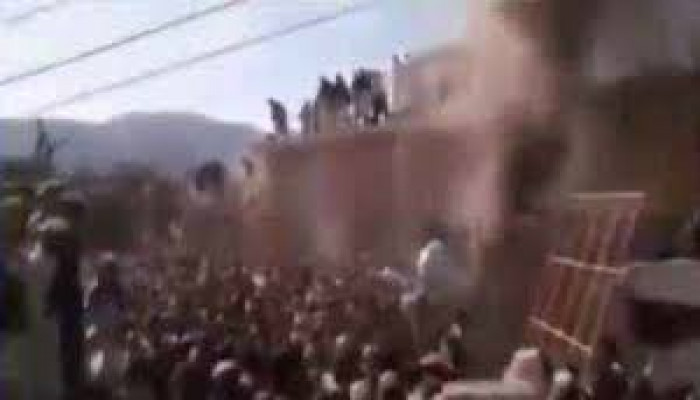Historic Hindu temple demolished in Pakistan’s Khyber district to construct commercial complex
- In Reports
- 10:32 PM, Apr 12, 2024
- Myind Staff
A historic Hindu temple near the Pakistan-Afghanistan border has been demolished, and construction of a commercial complex has commenced at the site in Khyber Pakhtunkhwa province. The temple, known as the 'Khyber Temple,' was located in the border town of Landi Kotal Bazaar in the Khyber district. It had gradually deteriorated over the years, disappearing brick by brick. Construction activities at the site began approximately 10 to 15 days ago, according to reports.
Officials from various administrative departments either denied awareness of the temple's existence or asserted that the construction was being carried out in compliance with regulations.
Ibrahim Shinwari, a prominent tribal journalist from Landi Kotal, asserted the existence of a historical temple in the main Landi Kotal Bazaar. He explained that the temple was situated in the heart of the bazaar but had been closed since 1947 when local Hindu families migrated to India. Shinwari noted that the temple suffered partial damage in 1992, following the demolition of the Babri Masjid in Ayodhya, India, by some clerics and seminarians.
As someone who grew up hearing stories about the temple from his forefathers, Shinwari emphasised that there was undeniable evidence of the temple's existence, referring to it as the 'Khyber Temple.'
Haroon Sarabdiyal of the Pakistan Hindu Mandir Management Committee stressed that it is the responsibility of the district administration and relevant government departments to ensure the protection and rehabilitation of historical buildings with religious significance to non-Muslims.
According to Haroon Sarabdiyal, the Antiquity Law of 2016 mandates the Archaeology and Museums Department, police, culture department, and local government to safeguard sites of historical significance, including places of worship.
However, Muhammad Irshad, the Assistant Commissioner of Landi Kotal, stated to Dawn newspaper that he was unaware of the temple's demolition. He mentioned that there was no record of the temple in the official land records of Khyber tribal district. Irshad clarified that all land in Landi Kotal Bazaar was owned by the state.
The official reiterated that a 'no objection certificate' has indeed been issued to the builder for the renovation and repair of some old shops in Landi Kotal Bazaar. Additionally, the tehsil municipal authorities have granted permission for commercial buildings or shops at all commercial and trade centers in tribal districts.
Tehsil Municipal Officer (TMO) Shahbaz Khan clarified that the local government is authorised to approve the construction of all commercial structures in the area only after their maps or drawings are approved, and the necessary fees are deposited. However, the municipal authorities admitted that they lack authentic and organised revenue records in the Khyber district.
Abdus Samad, the former TMO during whose tenure the deal for the construction of a commercial building was made, expressed complete ignorance about any orders issued by his office regarding this matter.
Landi Kotal patwari Jamal Afridi stated that he was unaware of the construction activity at the temple's site and mentioned that the revenue records did not mention a temple at that location. He expressed concern that if the government fails to fulfill its obligations towards religious minorities, all their places of worship and other historical buildings could vanish soon.
Ibrahim Shinwari questioned the assertions of the district administration in Khyber and the municipal authorities regarding the lack of official land records for the temple.
"It is the responsibility of the auqaf department to maintain and preserve historical non-Muslim places of worship, but the department had no office or employees in the Khyber tribal district," Shinwari stated. He further added, "Many aged tribal elders would bear testimony to this fact that there was a temple in the main Landi Kotal Bazaar."
Sarabdiyal suggested that places that were either not used by minorities or in a dilapidated condition could be utilised for any social welfare activity to the collective benefit of the local communities, rather than demolishing them and constructing something new.
Image Source: ToI







Comments